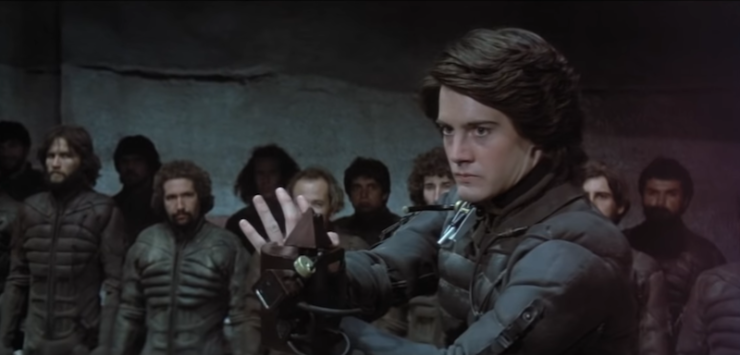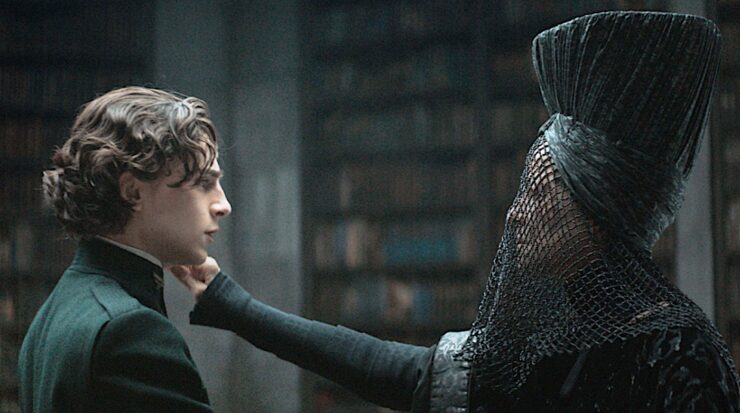Now that the cast is coming together, Denis Villeneuve’s upcoming adaptation of Dune is getting more attention than ever. And with that attention an interesting question has started cropping up with more frequency, one that bears further examination: Is Dune a “white savior” narrative?
It’s important to note that this is not a new question. Dune has been around for over half a century, and with every adaptation or popular revival, fans and critics take the time to interrogate how it plays into (or rebels against) certain story tropes and popular concepts, the white savior complex being central among them. While there are no blunt answers to that question—in part because Dune rests on a foundation of intense and layered worldbuilding—it is still an important one to engage and reengage with for one simple reason: All works of art, especially ones that we hold in high esteem, should be so carefully considered. Not because we need to tear them down or, conversely, enshrine them, but because we should all want to be more knowledgeable and thoughtful about how the stories we love contribute to our world, and the ways in which they choose to reflect it.
So what happens when we put Dune under this methodical scrutiny? If we peel back the layers, like the Mentats of Herbert’s story, what do we find?
Hollywood has a penchant for the white savior trope, and it forms the basis for plenty of big-earning, award-winning films. Looking back on blockbusters like The Last of the Mohicans, Avatar, and The Last Samurai, the list piles up for movies in which a white person can alleviate the suffering of people of color—sometimes disguised as blue aliens for the purpose of sci-fi trappings—by being specially “chosen” somehow to aid in their struggles. Sometimes this story is more personal, between only two or three characters, often rather dubiously labeled as “based on a true story” (The Blind Side, The Help, Dangerous Minds, The Soloist, and recent Academy Award Best Picture-winner Green Book are all a far cry from the true events that inspired them). It’s the same song, regardless—a white person is capable of doing what others cannot, from overcoming racial taboos and inherited prejudices up to and including “saving” an entire race of people from certain doom.
At face value, it’s easy to slot Dune into this category: a pale-skinned protagonist comes to a planet of desert people known as Fremen. These Fremen are known to the rest the rest of the galaxy as a mysterious, barbaric, and highly superstitious people, whose ability to survive on the brutal world of Arrakis provides a source of endless puzzlement for outsiders. The Fremen themselves are a futuristic amalgam of various POC cultures according to Herbert, primarily the Blackfeet Tribe of Montana, the San people, and Bedouins. (Pointedly, all of these cultures have been and continue to be affected by imperialism, colonialism, and slavery, and the Fremen are no different—having suffered horrifically at the hands of the Harkonnens even well before our “heroes” arrive.) Once the protagonist begins to live among the Fremen, he quickly establishes himself as their de facto leader and savior, teaching them how to fight more efficiently and building them into an unstoppable army. This army then throws off the tyranny of the galaxy’s Emperor, cementing the protagonist’s role as their literal messiah.
That sounds pretty cut and dried, no?
But at the heart of this question—Is Dune a white savior narrative?—are many more questions, because Dune is a complicated story that encompasses and connects various concepts, touching on environmentalism, imperialism, history, war, and the superhero complex. The fictional universe of Dune is carefully constructed to examine these issues of power, who benefits from having it, and how they use it. Of course, that doesn’t mean the story is unassailable in its construction or execution, which brings us to the first clarifying question: What qualifies as a white savior narrative? How do we measure that story, or identify it? Many people would define this trope differently, which is reasonable, but you cannot examine how Dune might contribute to a specific narrative without parsing out the ways in which it does and does not fit.
This is the strongest argument against the assertion that Dune is a white savior story: Paul Atreides is not a savior. What he achieves isn’t great or even good—which is vital to the story that Frank Herbert meant to tell.
There are many factors contributing to Paul Atreides’s transformation into Muad’Dib and the Kwisatz Haderach, but from the beginning, Paul thinks of the role he is meant to play as his “terrible purpose.” He thinks that because he knows if he avenges his father, if he becomes the Kwisatz Haderach and sees the flow of time, if he becomes the Mahdi of the Fremen and leads them, the upcoming war will not stop on Arrakis. It will extend and completely reshape the known universe. His actions precipitate a war that that lasts for twelve years, killing millions of people, and that’s only just the beginning.
Can it be argued that Paul Atreides helps the people of Arrakis? Taking the long view of history, the answer would be a resounding no—and the long view of history is precisely what the Dune series works so hard to convey. (The first three books all take place over a relatively condensed period, but the last three books of the initial Dune series jump forward thousands of years at a time.) While Paul does help the Fremen achieve the dream of making Arrakis a green and vibrant world, they become entirely subservient to his cause and their way of life is fundamentally altered. Eventually, the Fremen practically disappear, and a new Imperial army takes their place for Paul’s son, Leto II, the God Emperor. Leto’s journey puts the universe on what he calls the “Golden Path,” the only possible future where humanity does not go extinct. It takes this plan millennia to come to fruition, and though Leto succeeds, it doesn’t stop humans from scheming and murdering and hurting one another; it merely ensures the future of the species.
One could make an argument that the Atreides family is responsible for the saving of all human life due to the Golden Path and its execution. But in terms of Paul’s position on Arrakis, his effect on the Fremen population there, and the amount of death, war, and terror required to bring about humanity’s “salvation,” the Atreides are monstrous people. There is no way around that conclusion—and that’s because the story is designed to critique humanity’s propensity toward saviors. Here’s a quote from Frank Herbert himself on that point:
I am showing you the superhero syndrome and your own participation in it.
And another:
Dune was aimed at this whole idea of the infallible leader because my view of history says that mistakes made by a leader (or made in a leader’s name) are amplified by the numbers who follow without question.
At the center of Dune is a warning to be mistrustful of messiahs, supermen, and leaders who have the ability to sway masses. This is part of the reason why David Lynch’s Dune film missed the mark; the instant that Paul Atreides becomes a veritable god, the whole message of the story is lost. The ending of Frank Herbert’s Dune is not a heroic triumph—it is a giant question mark pointed at the reader or viewer. It is an uncomfortable conclusion that only invites more questions, which is a key part of its lasting appeal.
And yet…
There is a sizable hole in the construction of this book that can outweigh all other interpretations and firmly situate Dune among white savior tropes: Paul Atreides is depicted as a white man, and his followers are largely depicted as brown people.
There are ways to nitpick this idea, and people do—Paul’s father, Leto Atreides might not be white, and is described in the book as having “olive” toned skin. We get a sense of traditions from the past, as Leto’s father was killed in a bull fight, dressed in a matador cape, but it’s unclear if this is tied to their heritage in any sense. The upcoming film has cast Cuban-Guatemalan actor Oscar Isaac in the role of Duke Leto, but previous portrayals featured white men with European ancestry: U.S. actor William Hurt and German actor Jürgen Prochnow. (The Fremen characters are also often played by white actors, but that’s a more simple case of Hollywood whitewashing.) While the name Atreides is Greek, Dune takes place tens of thousands of years in the future, so there’s really no telling what ancestry the Atreides line might have, or even what “whiteness” means to humanity anymore. There’s a lot of similar melding elsewhere in the story; the ruler of this universe is known as the “Padishah Emperor” (Padishah is a Persian word that essentially translates to “great king”), but the family name of the Emperor’s house is Corrino, taken from the fictional Battle of Corrin. Emperor Shaddam has red hair, and his daughter Irulan is described as blond-haired, green-eyed, and possessing “patrician beauty,” a mishmash of words and descriptions that deliberately avoid categorization.
None of these factors detract from the fact that we are reading/watching this story in present day, when whiteness is a key component of identity and privilege. It also doesn’t negate the fact that Paul is always depicted as a white young man, and has only been played by white actors: first by Kyle MacLachlan, then by Alec Newman, and soon by Timothy Chalamet. There are many reasons for casting Paul this way, chief among them being that he is partly based on a real-life figure—T.E. Lawrence, better known to the public as “Lawrence of Arabia.” But regardless of that influence, Frank Herbert’s worldbuilding demands a closer look in order to contextualize a narrative in which a white person becomes the messiah of an entire population of people of color—after all, T.E. Lawrence was never heralded as any sort of holy figure by the people he worked alongside during the Arab Revolt.
The decision to have Paul become the Mahdi of the Fremen people is not a breezy or inconsequential plot point, and Herbert makes it clear that his arrival has been seeded by the Bene Gesserit, the shadowy matriarchal organization to which his mother, Jessica, belongs. In order to keep their operatives safe throughout the universe, the Bene Gesserit planted legends and mythologies that applied to their cohort, making it easy for them to manipulate local legends to their advantage in order to remain secure and powerful. While this handily serves to support Dune’s thematic indictment of the damage created by prophecy and religious zealotry, it still positions the Fremen as a people who easily fall prey to superstition and false idols. The entire Fremen culture (though meticulously constructed and full of excellent characters) falls into various “noble savage” stereotypes due to the narrative’s juxtaposition of their militant austerity with their susceptibility to being used by powerful people who understand their mythology well enough to exploit it. What’s more, Herbert reserves many of the non-Western philosophies that he finds particularly attractive—he was a convert to Zen Buddhism, and the Bene Gesserit are attuned to the Eastern concepts of “prana” and “bindu” as part of their physical training—for mastery by white characters like Lady Jessica.
While Fremen culture has Arab influences in its language and elsewhere, the book focuses primarily on the ferocity of their people and the discipline they require in order to be able to survive the brutal desert of Arrakis, as well as their relationship to the all-important sandworms. This speaks to Herbert’s ecological interests in writing Dune far more than his desire to imagine what an Arab-descended society or culture might look like in the far future. Even the impetus toward terraforming Arrakis into a green world is one brought about through imperialist input; Dr. Liet Kynes (father to Paul’s companion Chani) promoted the idea in his time as leader of the Fremen, after his own father, an Imperial ecologist, figured out how to change the planet. The Fremen don’t have either the ability or inclination to transform their world with their own knowledge—both are brought to them from a colonizing source.
Dune’s worldbuilding is complex, but that doesn’t make it beyond reproach. Personal bias is a difficult thing to avoid, and how you construct a universe from scratch says a lot about how you personally view the world. Author and editor Mimi Mondal breaks this concept down beautifully in her recent article about the inherently political nature of worldbuilding:
In a world where all fundamental laws can be rewritten, it is also illuminating which of them aren’t. The author’s priorities are more openly on display when a culture of non-humans is still patriarchal, there are no queer people in a far-future society, or in an alternate universe the heroes and saviours are still white. Is the villain in the story a repulsively depicted fat person? Is a disabled or disfigured character the monster? Are darker-skinned, non-Western characters either absent or irrelevant, or worse, portrayed with condescension? It’s not sufficient to say that these stereotypes still exist in the real world. In a speculative world, where it is possible to rewrite them, leaving them unchanged is also political.
The world of Dune was built that way through a myriad of choices, and choices are not neutral exercises. They require biases, thoughtfulness, and intent. They are often built from a single perspective, and perspectives are never absolute. And so, in analyzing Dune, it is impossible not to wonder about the perspective of its creator and why he built his fictional universe the way he did.
Many fans cite the fact that Frank Herbert wrote Dune over fifty years ago as an explanation for some of its more dated attitudes toward race, gender, queerness, and other aspects of identity. But the universe that Herbert created was arguably already quite dated when he wrote Dune. There’s an old-world throwback sheen to the story, as it’s built on feudal systems and warring family houses and political marriages and ruling men with concubines. The Bene Gesserit essentially sell their (all-female) trainees to powerful figures to further their own goals, and their sexuality is a huge component of their power. The odious Baron Harkonnen is obese and the only visibly queer character in the book (a fact that I’ve already addressed at length as it pertains to the upcoming film). Paul Atreides is the product of a Bene Gesserit breeding program that was created to bring about the Kwisatz Haderach—he’s literally a eugenics experiment that works.
And in this eugenics experiment, the “perfect” human turns out to be a white man—and he was always going to be a man, according to their program—who proceeds to wield his awesome power by creating a personal army made up of people of color. People, that is, who believe that he is their messiah due to legends planted on their world ages ago by the very same group who sought to create this superbeing. And Paul succeeds in his goals and is crowned Emperor of the known universe. Is that a white savior narrative? Maybe not in the traditional sense, but it has many of the same discomfiting hallmarks that we see replicated again and again in so many familiar stories. Hopefully, we’re getting better at recognizing and questioning these patterns, and the assumptions and agendas propagated through them. It gives us a greater understanding of fiction’s power, and makes for an enlightening journey.
Dune is a great work of science fiction with many pointed lessons that we can still apply to the world we live in—that’s the mark of a excellent book. But we can enjoy the world that Frank Herbert created and still understand the places where it falls down. It makes us better fans and better readers, and allows us to more fully appreciate the stories we love.
Emmet Asher-Perrin maintains that it would have been awesome if Paul had been a non-binary character, since the story is so adamant that he possesses important male and female attributes. You can bug him on Twitter, and read more of her work here and elsewhere.













